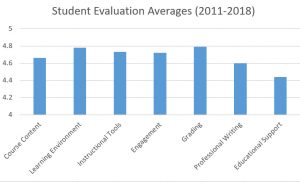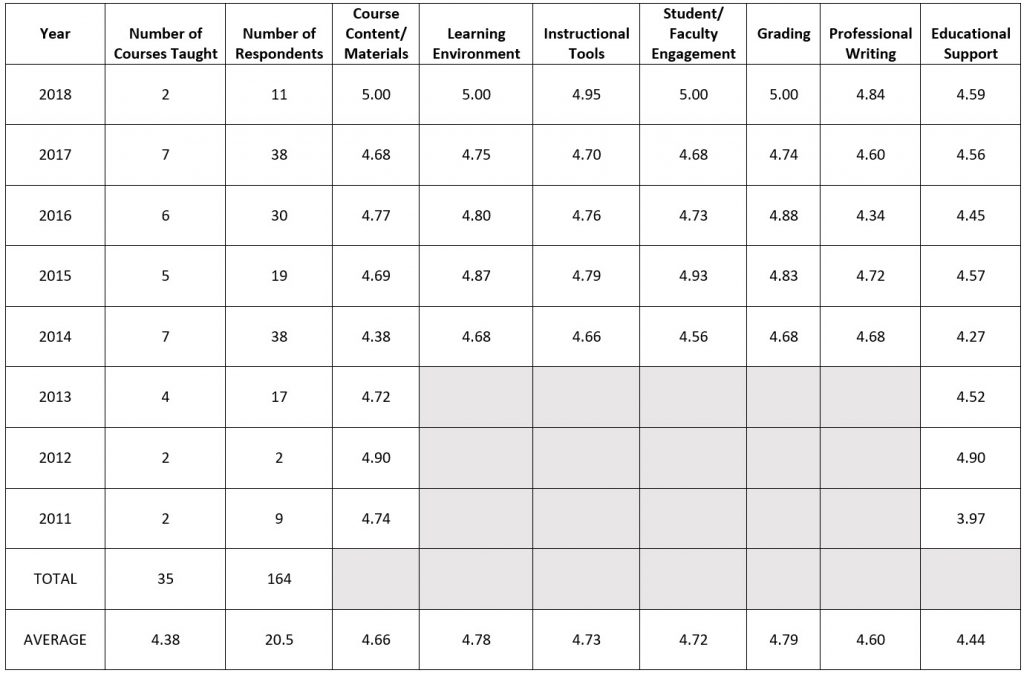 A few weeks ago I shared some reflections on my life as an adjunct professor. Since writing that post, I’ve spent some time looking back over the last eight years.
A few weeks ago I shared some reflections on my life as an adjunct professor. Since writing that post, I’ve spent some time looking back over the last eight years.
Student Evaluations
In higher education, students are usually afforded the opportunity to evaluate their professors. In my case as an adjunct professor at Hodges University, my students were provided an opportunity to complete an optional online questionnaire near the end of the semester. These anonymous evaluations were then shared with me only after the semester had ended and after I had submitted grades for the course.
During the eight years I served as an adjunct faculty member, I taught a total of 35 undergraduate courses. The enrollment in most of these courses was 20-25 students. Of the approximately 700 students I taught, 164 took the time to complete an evaluation of my teaching.
Most of the evaluation came in the form of Likert questions scored on a strong disagree to strongly agree scale. A smaller portion of the evaluation allowed students to provide narrative responses to questions about how the professor could improve the course and what the student liked about the course.
Quantitative Data
The quantitative data was relatively easy to assemble and to compare at the semester, year, and entire tenure levels.
- Course Content/Materials – 4.66
- Learning Environment – 4.78
- Instructional Tools – 4.73
- Student/Faculty Engagement – 4.72
- Grading – 4.79
- Professional Writing – 4.60
- Educational Support – 4.44
Qualitative Data
While the overall response rate was between 1 in 5 and 1 in 4 students, very few students opted to answer the open ended questions that had the potential to yield rich qualitative data. Most who took the time to do so were either those who had very favorable things to say about the course or my role as their professor or had a specific issue with the course or with my teaching.
Unsurprisingly, the most common frustration came around grading and overall expectations for the course or for a specific major assignment.
Interestingly, the most common praises focused on overall course design and on the quality and timeliness of the feedback I provided on graded assignments.
So What?
I recognize that there is much written about the value of student evaluations. My reflections here are an attempt to summarize what students said of me rather than to contribute to that larger discussion.
I am, however, glad that I did not wait to learn what students thought of me and of my teaching until after the semester ended. Instead, I relied on providing students ways to provide feedback about their experience early in the semester. These opportunities allowed for direct feedback that required students to associate remarks with their name and anonymous feedback to learn what students wanted me to know that they would rather me not know came from them.
Without a doubt, I am a better teacher because my students provided me with feedback and because I took such feedback as an opportunity to improve.
Bonus
Since the focus of this blog is not about matters of faith that matter, I’m adding some bonus content focused on the value of student evaluations in religious life. I believe that every community of faith should have a process in place that actively solicits feedback from adult learners, and utilizes such data in the planning process for future educational and enrichment opportunities.
- Share something helpful you learned as the result of feedback from a student.
- Revisit a time you sat through a class, workshop, training or other educational experience that needed improving yet failed to provided students an opportunity to provide suggestions for improvement.
- Explain how your community of faith incorporates student evaluations into adult education and enrichment programming.
